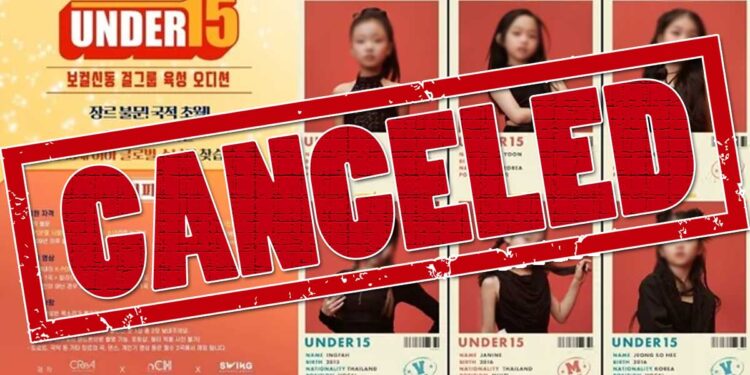It’s all signed and sealed! Korean broadcaster MBN has officially canceled “Under 15″ K-pop survival show. But just when the public can eventually breathe a sigh of relief, more speculations emerged, stirring more concerned that the show will possibly air via different means.
Therefore, to better understand the gravity of the situation, let’s once again review why this K-pop survival show is deemed problematic. And why many are worried about a possible future broadcast.
MBN Officially Canceled “Under 15” K-pop Survival Show
After massive backlash and controversy, MBN has officially canceled “Under 15”, a K-pop survival audition show that aimed to debut a fifth-generation K-pop girl group with participants under the age of 15. The show faced fierce criticism for its alleged sexualization of minors, child exploitation, and extreme competition.
While the official broadcast was canceled, the production company Crea Studio still released the first episode on YouTube on March 22, just days before their emergency press conference on March 25. This raised additional concerns, as it proved that while MBN had withdrawn from the project, the production team seemed determined to push ahead through alternative platforms.
During the press conference, Crea Studio’s co-CEOs Seo Hye Jin and Hwang In Young, alongside producer Yong Seok In, expressed regret for the backlash but continued to defend the program’s intention.
They claimed their goal was to host an “Alpha Generation audition” to discover the next wave of young K-pop idols. They also highlighted that no objections were raised during internal reviews by the Korea Communications Commission (KCC), which then, however, denied by the KCC later.
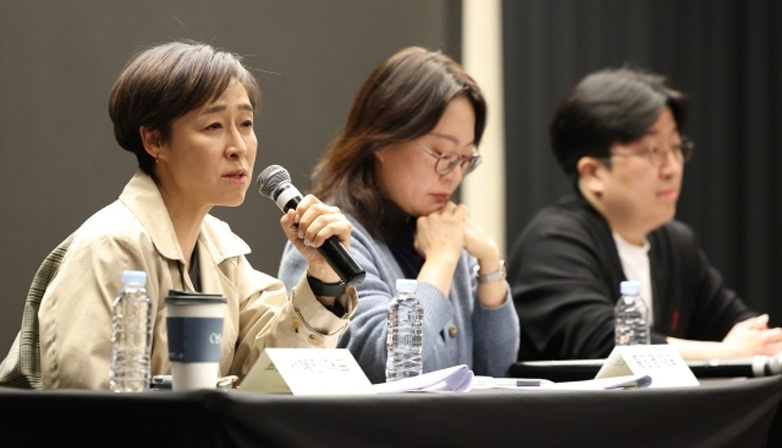
However, the public remained unconvinced. Advocacy groups, including the Citizens’ Coalition for Democratic Media (CCDM) and the Women’s Party, called for the complete abolition of the program and the permanent disposal of all produced content, citing the show’s core issues.
Undisputable Reasons Why the Show Is Problematic
The controversies surrounding “Under 15” are neither baseless nor exaggerated. According to the advocacy groups, there are clear, undeniable reasons why they considered the show as problematic.
1. Sexualization and Objectification of Minors
One of the most significant issues was the blatant sexualization of young girls. Promotional images showed contestants wearing heavy makeup and revealing outfits. Some images even featured barcodes under their profiles, which critics condemned as a clear form of objectification.
The participants, aged between 8 and 15 years old, were labeled as “rookies” in categories like vocal rookies, performance rookies, and multi rookies. Although the show deliberately concealed their ages during performances, it didn’t diminish the public’s concerns about the implied sexualization and harmful portrayal of minors.
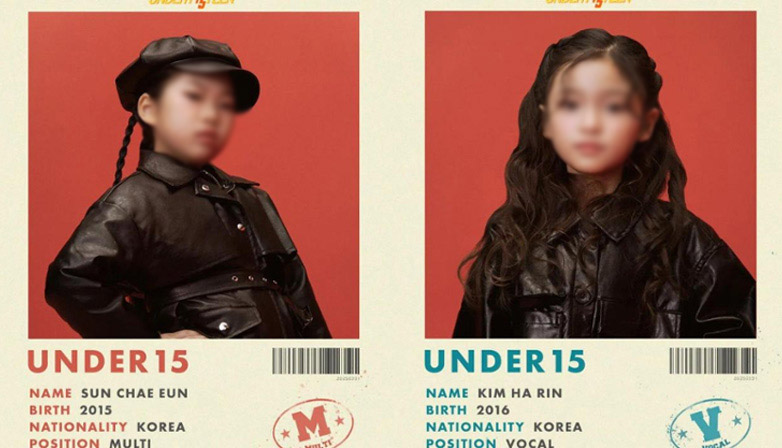
2. Extreme Competition and Emotional Harm
The structure of “Under 15” encouraged excessive competition among young children, reminiscent of the darker aspects of the K-pop industry.
Experts and advocacy groups warned that such experiences could lead to severe psychological and emotional damage. Young contestants were pressured to meet unrealistic beauty and performance standards, reinforcing harmful messages about self-worth and physical appearance.
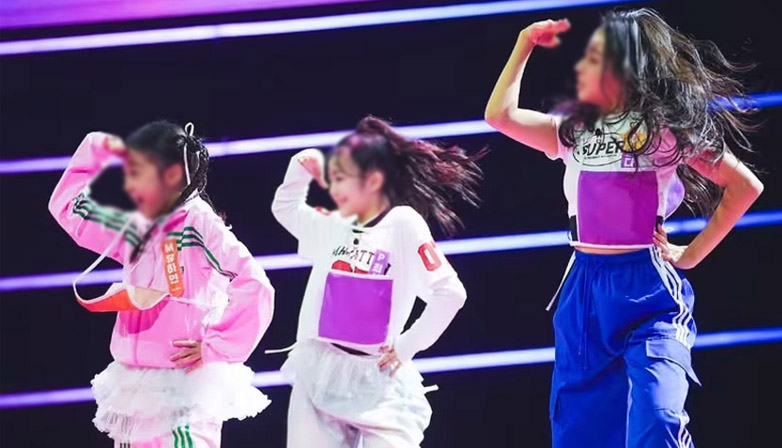
3. Violation of Child Rights
Critics further argued that “Under 15” undermined the basic rights of children. Intense rehearsal schedules and performance expectations are often detrimental to a child’s development. The program also faced accusations of potentially infringing on participants’ education and well-being.
The Women’s Party condemned the show as a form of child exploitation, warning that it could normalize the commodification of young girls in the entertainment industry. They firmly demanded a ban on similar programs in the future.
4. Negligence by Production and Broadcasting Authorities
Despite repeated warnings, Crea Studio proceeded with the show’s production, claiming that no issues were identified by broadcasting regulators. This negligence highlighted significant gaps in media oversight and the lack of ethical responsibility within the entertainment industry.
The Citizens’ Coalition for Democratic Media (CCDM) expressed concern about the producers’ lack of accountability, criticizing their attempts to justify the show despite public outcry.
Concerns About Future Broadcast: A Reflection of the K-pop Industry’s Dark Side?
While MBN’s cancellation decision marked a temporary victory, fears remain that “Under 15” may resurface through YouTube or OTT platforms.
The first episode alone, uploaded on Crea Studio’s official YouTube channel, garnered over 100,000 views within eight days. Although they disabled the comment sections and has now made the video private, the studio’s initial refusal to take them down raised concerns that they might pursue alternative distribution channels.
Critics then believe that this situation has shed light on the darker side of the K-pop industry. After all, many have often pointed out how minors and underage idols often become subject to exploitative conditions.
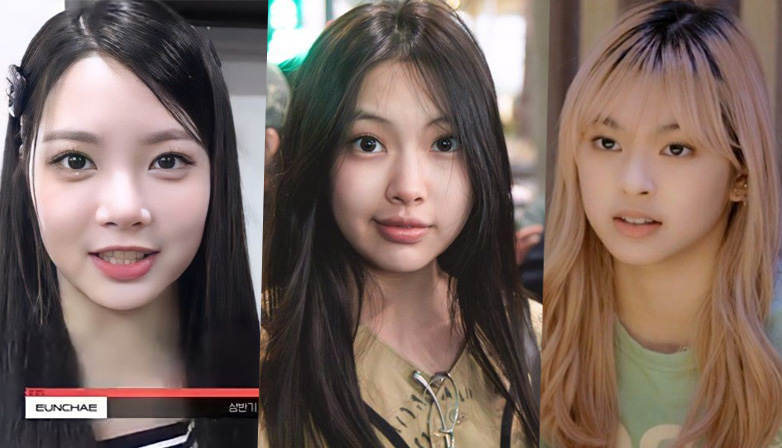
Hence, the rise of survival shows like “Under 15” emphasizes the need for stricter regulations to protect young performers from harm.
Advocacy groups then critically urged the regulatory bodies to implement detailed standards to prevent similar incidents. Additionally, they have also called for greater accountability from both production companies and broadcasters who continue to prioritize profits over ethical concerns.
The backlash against “Under 15” now serves as a powerful reminder of the public’s role in demanding ethical media consumption. While the K-pop industry has undoubtedly achieved global success, ensuring the safety and dignity of its youngest performers must remain a top priority.
The Now-Canceled “Under 15” K-pop Survival Show: Your Thoughts?
Finally, with “Under 15” K-pop survival show canceled on MBN for now, the controversy brings us to more questions:
- Should they force stricter regulations to prevent the exploitation and sexualization of minors in the entertainment industry?
- What responsibility do production companies and broadcasters have in protecting young talent?
- Can the K-pop industry balance global success with ethical and responsible practices?
What do you think? Share your thoughts about the canceled “Under 15” and the future of K-pop survival show programs in the comments below.
Join us on Kpoppost’s Instagram, Threads, Facebook, X, Telegram channel, WhatsApp Channel and Discord server for discussions. And follow Kpoppost’s Google News for more Korean entertainment news and updates.

